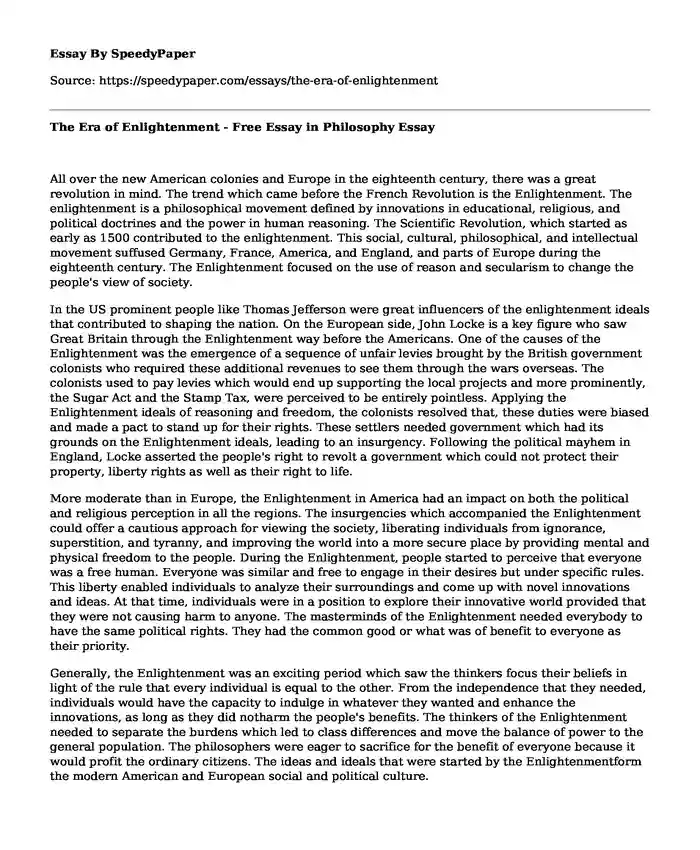
| Type of paper: | Essay |
| Categories: | History Philosophy |
| Pages: | 3 |
| Wordcount: | 639 words |
All over the new American colonies and Europe in the eighteenth century, there was a great revolution in mind. The trend which came before the French Revolution is the Enlightenment. The enlightenment is a philosophical movement defined by innovations in educational, religious, and political doctrines and the power in human reasoning. The Scientific Revolution, which started as early as 1500 contributed to the enlightenment. This social, cultural, philosophical, and intellectual movement suffused Germany, France, America, and England, and parts of Europe during the eighteenth century. The Enlightenment focused on the use of reason and secularism to change the people's view of society.
In the US prominent people like Thomas Jefferson were great influencers of the enlightenment ideals that contributed to shaping the nation. On the European side, John Locke is a key figure who saw Great Britain through the Enlightenment way before the Americans. One of the causes of the Enlightenment was the emergence of a sequence of unfair levies brought by the British government colonists who required these additional revenues to see them through the wars overseas. The colonists used to pay levies which would end up supporting the local projects and more prominently, the Sugar Act and the Stamp Tax, were perceived to be entirely pointless. Applying the Enlightenment ideals of reasoning and freedom, the colonists resolved that, these duties were biased and made a pact to stand up for their rights. These settlers needed government which had its grounds on the Enlightenment ideals, leading to an insurgency. Following the political mayhem in England, Locke asserted the people's right to revolt a government which could not protect their property, liberty rights as well as their right to life.
More moderate than in Europe, the Enlightenment in America had an impact on both the political and religious perception in all the regions. The insurgencies which accompanied the Enlightenment could offer a cautious approach for viewing the society, liberating individuals from ignorance, superstition, and tyranny, and improving the world into a more secure place by providing mental and physical freedom to the people. During the Enlightenment, people started to perceive that everyone was a free human. Everyone was similar and free to engage in their desires but under specific rules. This liberty enabled individuals to analyze their surroundings and come up with novel innovations and ideas. At that time, individuals were in a position to explore their innovative world provided that they were not causing harm to anyone. The masterminds of the Enlightenment needed everybody to have the same political rights. They had the common good or what was of benefit to everyone as their priority.
Generally, the Enlightenment was an exciting period which saw the thinkers focus their beliefs in light of the rule that every individual is equal to the other. From the independence that they needed, individuals would have the capacity to indulge in whatever they wanted and enhance the innovations, as long as they did notharm the people's benefits. The thinkers of the Enlightenment needed to separate the burdens which led to class differences and move the balance of power to the general population. The philosophers were eager to sacrifice for the benefit of everyone because it would profit the ordinary citizens. The ideas and ideals that were started by the Enlightenmentform the modern American and European social and political culture.
Works Cited
Curran, Andrew S. The Anatomy of Blackness: Science and slavery in an Age of Enlightenment. JHU Press, 2011.
Shestack, Jerome J. "The philosophic foundations of human rights." Human Rights. Routledge, 2017. 3-36. Accessed from http://www.jstor.org/page/info/about/policies/terms.jsp.
Smith, Brian. "On revolution: Arendt, Locke and republican revisionism." History of Political Thought 36.3 (2015): 560-579. Accessed from https://www.researchgate.net/profile/Brian_Smith55/publication/281374097_On_revolution_Arendt_locke_and_republican_revisionism/links/55e4592d08ae6abe6e8f3892/On-revolution-Arendt-locke-and-republican-revisionism.pdf
Cite this page
The Era of Enlightenment - Free Essay in Philosophy. (2022, Aug 22). Retrieved from https://speedypaper.com/essays/the-era-of-enlightenment
Request Removal
If you are the original author of this essay and no longer wish to have it published on the SpeedyPaper website, please click below to request its removal:
- Free Essay on Paleolithic Diet
- Essay Sample with Petitioning for College Credits
- Negative and Positive Peer Influence. Free Essay Example.
- Free Essay for Students on Legalizing Marijuana
- Diversity Verses Inclusion
- Black Americans Do Not Trust the Medical Sector. Free Essay
- Essay Sample on Occupational Hygiene Methods
Popular categories




